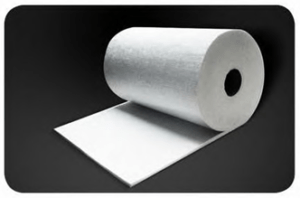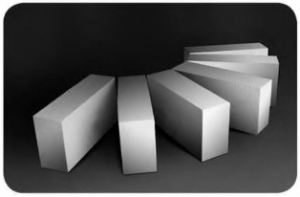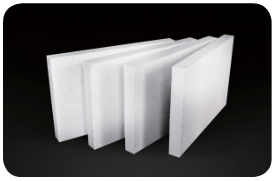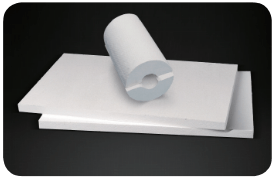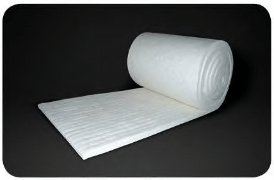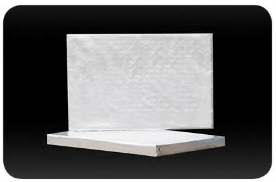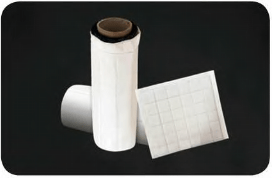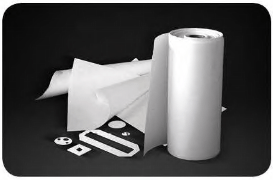Refractory Materials
Biowool Blanket
Biowool blanket
is High strength, needled insulating blanket that is made from Biowool bulk. The combination of spinning and needling operation produces tough, resilient, and strong blankets. Which have superior thermal and mechanical properties. Biowool blanket is used in a wide range of applications including thermal insulation, appliances. The blanket can be folded, compressed, and encapsulated to produce modules. lt can meet European regulatory requirements (Directive 97/69/EC).
Features
- Excellent thermal shock resistance
- Excellent thermal stability
- High tensile strength
- Low thermal conductivity
- Low heat storage
Typical Applications
- Pipe wrap
- Furnace and kiln back-up insulation
- Annealing furnace linings
- Appliances insulation
- Expansion joint seals
Typical Parameters
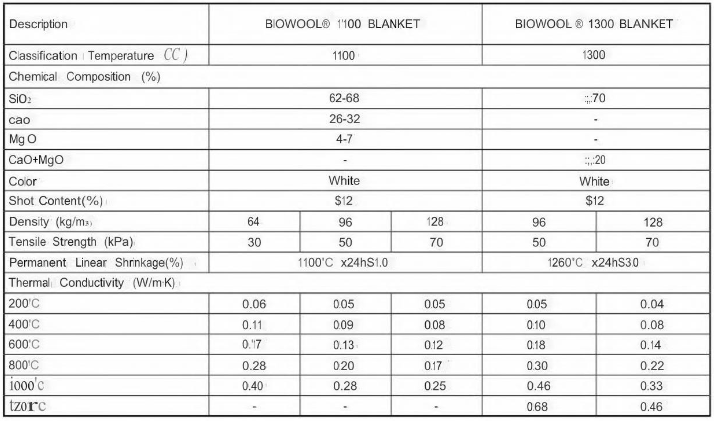
Brick
INSULATING FIREBRICK
Insulating Firebrick
is made from high-purity refractory powder and organic fillers which burn out during manufacture to give a uniform and controlled pore store. The brick is compressed in a vacuum and sintered under high temperatures. L Insulating Firebrick is widely used as hot face refractory lining or backup insulation in various kinds of industrial furnaces.
Features
-
Excellent thermal shock resistance
-
Accurate and customized dimension
-
High crushing strength
-
Low thermal conductivity
-
Low heat storage
Typical Applications
-
Metallurgy industry
-
Petrochemical industry
-
Ceramics industry
-
Aluminum industry
-
Glass industry
Typical Parameters
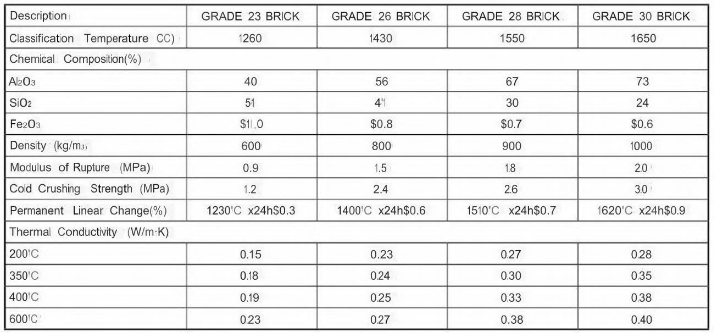
CALCIUM SILICATE INSULATION
LY-H CALCIUM SILICATE INSULATION BOARD
LY-H calcium silicate insulation board
is manufactured from xonotlite and reinforced fiber. It is entirely asbestos-free and non-poisonous to the human body. LY-H board is a kind of high efficiency and energy-saving product, with the maximum heat-resistant temperature up to 1000 ℃ .
LY-H calcium silicate insulation board
LY has characteristics such as excellent thermal stability, corrosion resistance and convenient construction, can be widely used in industrial furnace insulation.
Features
-
Excellent thermal stability
-
High rigidity and light weight
-
Can be machined,cut and shaped easily
-
Low thermal conductivity
-
Low heat storage
Typical Applications
- Cement,ceramic and glass
- Refining,iron and steel
- Non ferrous
- Petrochemical
- Power Plant
Typical Parameters
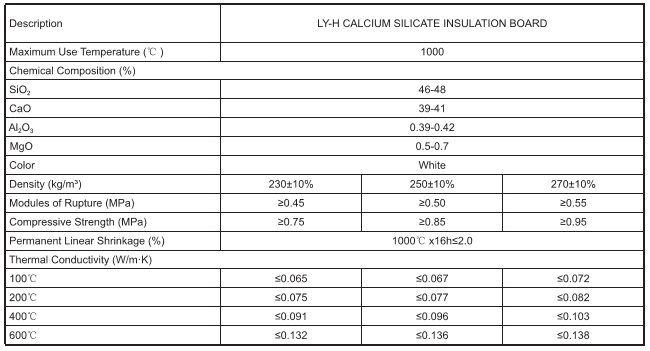
LY-M CALCIUM SILICATE INSULATION SERIES
LY-M calcium silicate insulation series
include board, pipe and other shaped product. LY-M calcium silicate insulation series is manufactured form tobermorite and reinforced fiber. LY-M series is a kind of high efficiency and energy-saving product, with the maximum heat-resistant temperature up to 650 ℃ .
LY-M calcium silicate insulation series
has characteristics such as Low thermal conductivity, high rigidity and convenient construction, can be widely used for insulation in industrial furnaces and thermal pipelines.
Features
-
Excellent thermal stability
-
High rigidity and light weight
-
Can be machined,cut and shaped easily
-
Low thermal conductivity
-
Low heat storage
Typical Applications
- Cement,ceramic and glass
- Refining,iron and steel
- Non ferrous
- Petrochemical
- Power Plant
Typical Parameters
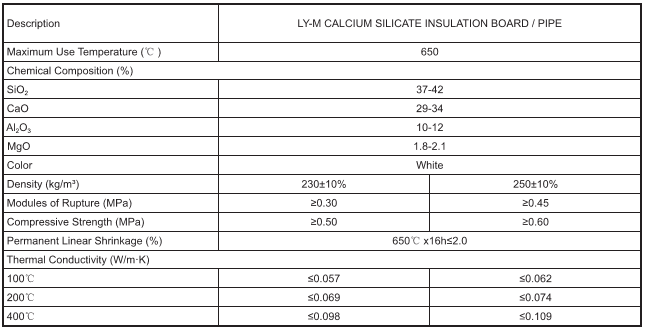
“The data shown are typical average results of tests under standard procedures and are subject to variation. Results should not be used for specification purposes or creating any contractual obligation. For more information on the safety application or materials, please refer to the work practices and material safety data sheet.”
Ceramic Blanket
Blanket
is high strength, needled insulating blanket. The combination of long spun fibers and needling operation produce tough, resilient, and strong blankets. which resist earing both before and after heating. The blanket is completely inorganic and available in a variety of temperature grades, densities, and sizes. L blanket can be folded, compressed, and encapsulated to produce modules.
Features
-
Excellent thermal shock resistance
-
Excellent thermal stability
- High tensile strength
- Low thermal conductivity
- Low heat storage
Typical Applications
- Pipe wrap
- Furnace and kiln back-up insulation
- Chimeny insulation
- Annealing furnace linings
- Process heater linings
Typical Parameters
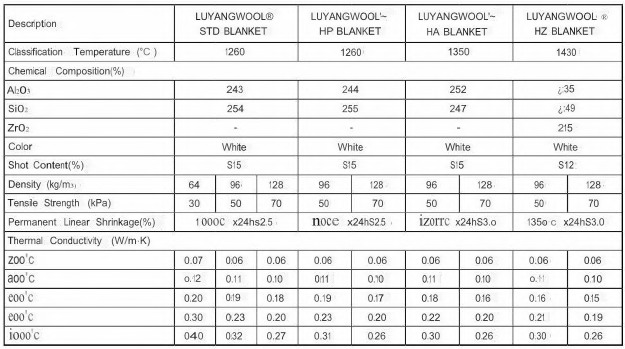
“The data shown are typical average results of tests under standard procedures and are subject to variation. Results should not be used for specification purposes or creating any contractual obligation. For more information on the safety application or materials, please refer to the work practices and material safety data sheet.”
Microporous Hard Board
MICROPOROUS HARD BOARD
Microporous Board
is an efficient insulation product based on advanced microporous insulation technology. At low temperature, it has a lower thermal conductivity than still air. The thermal conductivity increases very little with the increase of temperature. At high temperature, its insulation effect is 3-4 times higher than traditional insulation materials.
Microporous H Board has high compressive strength, covered with aluminum foil or glass fiber cloth. lt is an excellent choice for the lightweight and energy-saving application of kiln.
Features
-
Excellent thermal shock resistance
-
Excellent thermal stability
-
Low thermal conductivity
-
Low heat storage
Typical Applications
-
Back-up insulation in high-temperature furnaces
-
Appliances insulation
-
Fire protection equipment
-
Electronic devices
Typical Parameters
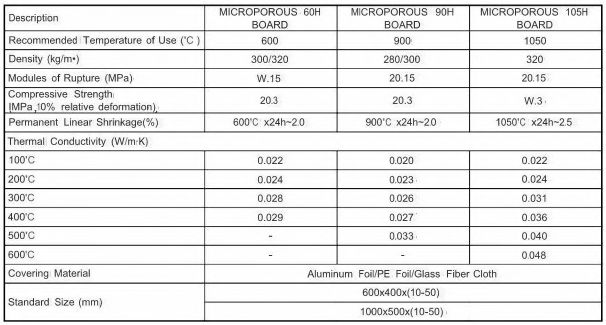
“The data shown are typical average results of tests under standard procedures and are subject to variation. Results should not be used for specification purposes or creating any contractual obligation. For more information on the safety application or materials, please refer to the work practices and material safety data sheet.”
Microporous Soft Board
MICROPOROUS SOFT BOARD
Microporous S Board
is a flexible and efficient microporous insulation material formed by special process.lt is covered with glass fiber cloth. Microporous S Board can be used as insulation materials for various kinds of pipes and complex spaces.
Features
-
Good fit to curved surfaces
-
Low thermal conductivity
-
Low heat storage
-
Non-combustibility
Typical Applications
- Pipe insulation
- Fire protection
- Insulation for curved surfaces of high-temperature furnace walls and equipment
Typical Parameters
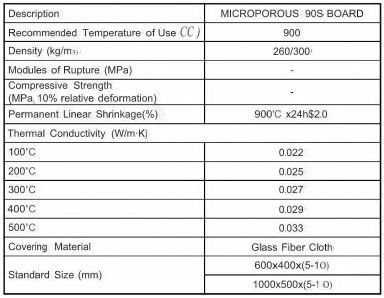
“The data shown are typical average results of tests under standard procedures and are subject to variation. Results should not be used for specification purposes or creating any contractual obligation. For more information on the safety application or materials, please refer to the work practices and material safety data sheet.”
Paper
Paper
is manufactured by blending binders, and additives. The specialized paper- making process is used to form uniform and flexible paper paper is easy to be handled and cut. L paper can be used in a wide range of applications as thermal insulation. lt is especially suited to used in gaskets and as a parting medium.
Typical Parameters
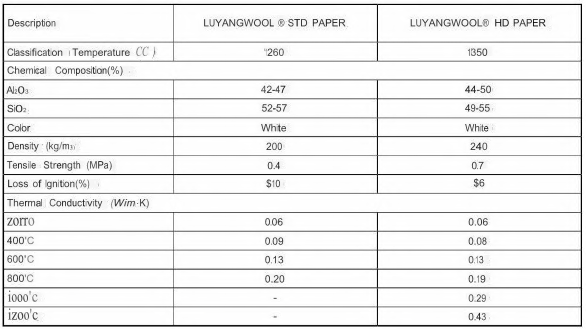
“The data shown are typical average results of tests under standard procedures and are subject to variation. Results should not be used for specification purposes or creating any contractual obligation. For more information on the safety application or materials, please refer to the work practices and material safety data sheet.”
Features
-
Excellent thermal shock resistance
-
Can be machined,cut and shaped easily
-
High flexibility
-
Low thermal conductivity
-
Good dielectric strength
Typical Applications
-
Gaskets for high temperature applications
-
Gaskets for domestic appliances
-
Back-up lining for metal troughs
-
Thermal barriers for vehicles
-
Expansion joints

